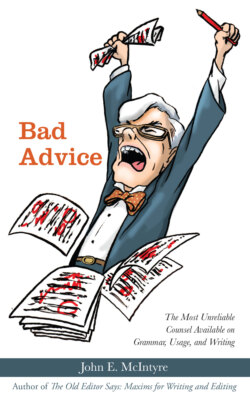Читать книгу Bad Advice - John E. McIntyre - Страница 10
На сайте Литреса книга снята с продажи.
ОглавлениеDo not split an auxiliary verb from the main verb with an adverb.
Over the years, the split infinitive superstition, wrong in the first place, has been expanded into another area, the belief that compound verbs must not be split.
Eric Partridge in Usage and Abusage writes: “In a compound verb (have seen) with an adverb, the adverb comes between the auxiliary and the participle (“I have never seen her”); or, if there are two or more auxiliaries, immediately after the first auxiliary (“I have always been intending to go to Paris”); that order is changed only to obtain emphasis, as in “I never have seen her” (with stress on “have”). ... There is, however, a tendency to move the adverb from its rightful and natural position for inadequate reasons. ...”
The tendency Partridge alludes to has been prevalent among American journalists, the “split-verb” prohibition apparently having been invented by nineteenth-century American newspaper editors and propagated among their descendants and journalism school faculty. Journalists have been so schooled to write things like “we always have done it this way” that it sounds more natural to them than the idiomatic “we have always done it this way.”
This nonsensical rule was kept on life support by The Associated Press Stylebook until 2019, when the stylebook editors were persuaded to drop it and announced the decision at the national conference of ACES: The Society for Editors.
Better late than never.
